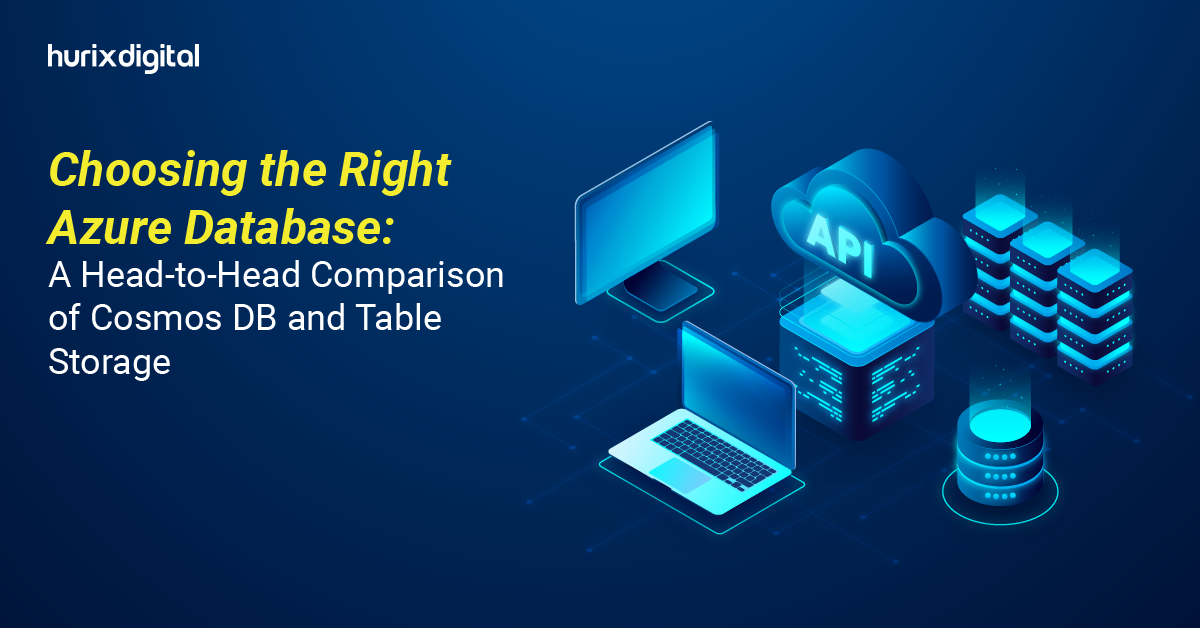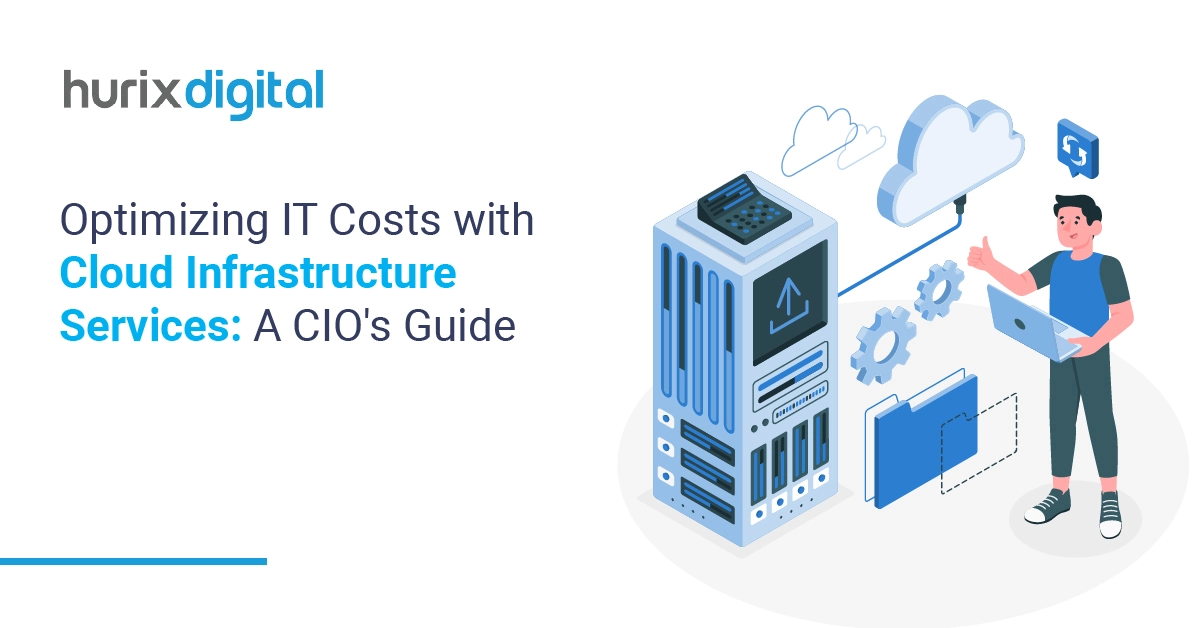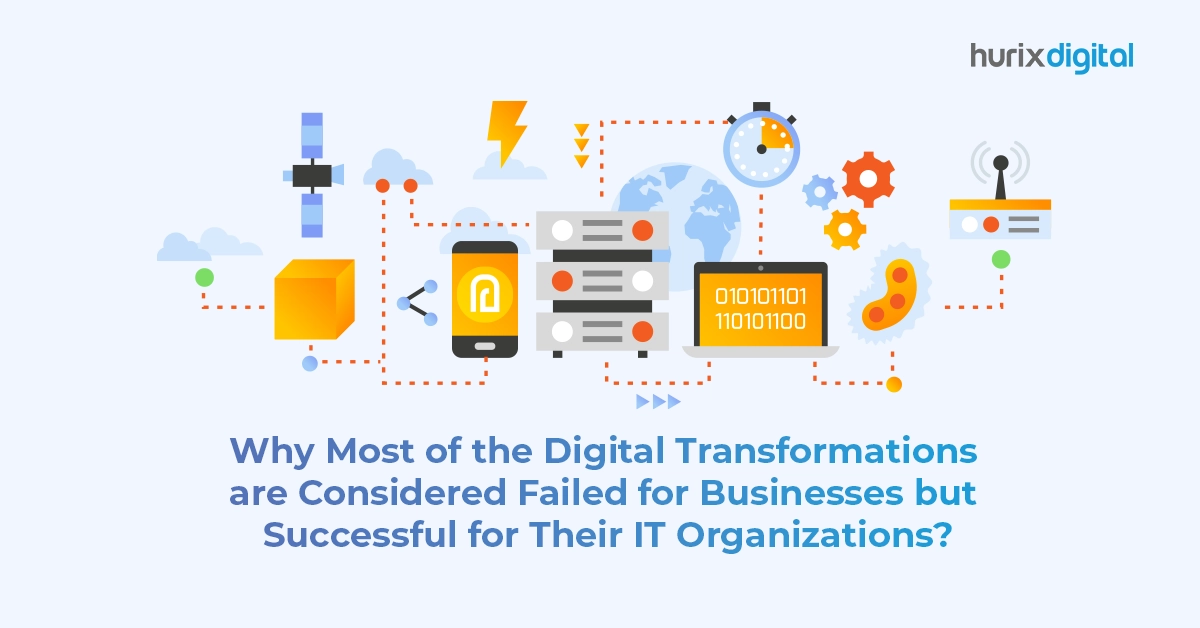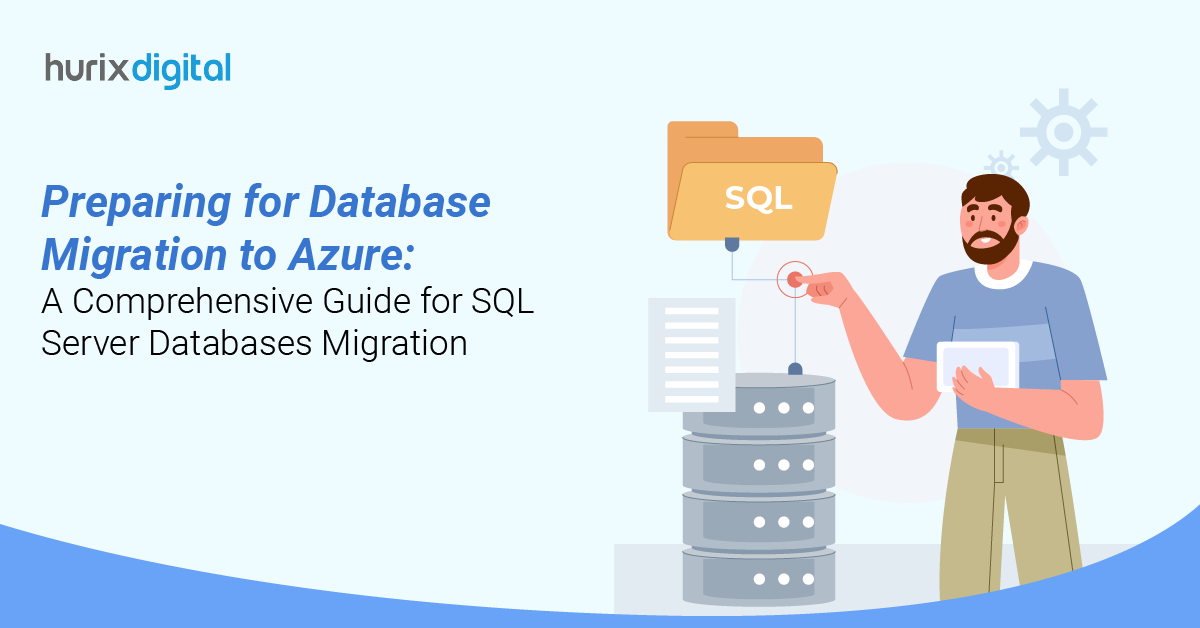
Choosing the Right Azure Database: A Head-to-Head Comparison of Cosmos DB and Table Storage
Summary
This blog compares Azure Cosmos DB and Azure Table Storage, analyzing their capabilities, limitations, use cases, and suitability for AI integration, to help organizations choose the right cloud database.
The IT world is getting demanding nowadays, where data is the most crucial portion, businesses are constantly searching for the ideal platform to meet their data needs. Two prominent offerings from Microsoft Azure, Azure Cosmos DB, and Azure Table Storage where each come with its unique capabilities, advantages, and also limitations.
In this blog, we explore these two storage options and provide insights to help organizations make informed decisions.
Table of Contents:
- What is Azure Cosmos DB?
- What are the Limitations of Azure Cosmos DB?
- What is Azure Table Storage?
- What are Azure Table Storage Limitations?
- When to Choose Azure Cosmos DB for Your Business Needs?
- When to Choose Azure Table Storage?
- Future of AI: Which Database Should You Prefer Considering AI Integration?
- Which Cloud Database Should You Choose: Azure Cosmos DB or Azure Table Storage?
- Conclusion
What is Azure Cosmos DB?
Azure Cosmos DB is a globally distributed, multi-model, and NoSQL database service provided by Microsoft Azure. It offers high availability, scalability, and low latency for big critical applications. The best feature of Cosmos DB is it supports various models, like document, key-value, graph, and column-family databases so that we can use it in different use cases.
The features include automatic multi-region replication, there are multiple consistency levels present in cosmos db based on business needs, and comprehensive security measures, allowing developers to build applications that can scale horizontally across geographies with ease. Azure Cosmos DB is a fully managed service offered by Microsoft, which means we do not need to worry about infrastructure management so that businesses can focus on application development without worrying about database maintenance or uptime.
What are the Limitations of Azure Cosmos DB?
- Cost: Azure Cosmos DB can be expensive, especially at scale. The pricing model includes charges for provisioned throughput (RU/s), storage, and data transfer, which can add up for applications with large datasets or high read/write requirements.
- Complexity: Setting up and managing Cosmos DB may be challenging, particularly for teams in organizations unfamiliar with NoSQL databases or distributed architectures.
What is Azure Table Storage?
Azure Table Storage is also another NoSQL offering of Microsoft Azure that stores key-value data, and it provides high availability and scalability. It is perfect for storing large amounts of structured data that can be partitioned across a wide distribution. However, despite its simplicity and cost-effectiveness advantages, Table Storage has limitations, particularly for businesses looking to scale or rapidly adapt to internal and external changes.
What are Azure Table Storage Limitations?
1. Scalability Limits
While Table Storage can handle a large amount of data, it is not designed for very large-scale applications or workloads requiring low-latency data retrieval. For the big mission-critical applications that handle critical transactions or real-time analytics, because sometimes it leads to performance bottlenecks.
2. Query Limitations
Table Storage offers limited querying capabilities and does not support complex queries, multi-key queries, or joins. For businesses that depend on complex data relationships or require sophisticated querying features, these limitations can be a significant drawback.
3. Indexing Restrictions
Table Storage supports single property indexing only. For larger datasets or multi-dimensional queries, this can severely limit performance, making it harder to extract valuable insights.
When to Choose Azure Cosmos DB for Your Business Needs?
Azure Cosmos DB stands out as a robust solution suited for businesses of all sizes, particularly for those that require advanced features. Here’s why you should go for Azure Cosmos DB:
1. Unmatched Scalability
Unlike Table Storage, Azure Cosmos DB is designed to scale horizontally across multiple regions, allowing businesses to process millions of requests per second. This makes it the perfect choice for companies growing at an exponential rate or operating on a global scale.
2. Global Distribution
With the help of Azure Cosmos DB, data can be distributed globally across Azure’s global network. It ensures low latency. This capability is valuable for customers that operate in the global market and also require rapid data access.
3. Advanced Query Capabilities
Cosmos DB supports SQL-like queries as well as rich querying features with filtering, sorting, and indexing capabilities across multiple properties. This empowers businesses to execute complex queries efficiently, making the most of their data.
4. Multi-Model Support
While Table Storage is limited to key-value pairs, Cosmos DB provides a multi-model database experience, allowing you to choose between document, graph, key-value, or column-family data models based on your project needs.
When to Choose Azure Table Storage?
Choosing Azure Table Storage for your business needs depends on various factors related to your application’s requirements, data structure, and scalability needs. Here are some scenarios where Azure Table Storage can be an ideal choice
1. Key-Value Pair Storage
If your data can be represented as a key-value structure, Azure Table Storage is an excellent option. It allows for efficient retrieval and indexing of data based on a partition key and row key.
2. Cost-Effective Storage
Azure Table Storage is often more economical than traditional relational databases for applications requiring low-cost storage for vast amounts of data.
3. No Complex Joins
If your use case does not require complex joins, foreign keys, or multi-table transactions, Table Storage can offer simpler and faster data access patterns
Future of AI: Which Database Should You Prefer Considering AI Integration?
As per the statement of Satya Nadella, Microsoft chairman and chief executive officer -“OpenAI relies on Cosmos DB to dynamically scale their ChatGPT service – one of the fastest-growing consumer apps ever – enabling high reliability and low maintenance.”
1. Seamless Integration with AI Services
Azure Cosmos DB a NoSQL Database has the capability to integrate with any Microsoft AI or Machine Learning tools, and that makes it easier for businesses can make the best use of their data for machine learning purposes. This Seamless Integration allows organizations to watch real-time Analytics that help them for better decision-making.
2. Support for Big Data Analytics
Azure Cosmos DB can store and analyze large datasets and that makes it an attractive option for businesses that are looking to implement AI strategies. Whether you’re analyzing customer behavior or predicting market trends, having a structured database and a robust data storage solution is critical.
3. Future-Ready Technology
Microsoft is constantly enhancing Cosmos DB to support new technological advancements, ensuring that organizations leveraging it can adapt to future challenges in the AI landscape. As these AI technologies evolve, businesses that use Cosmos DB will be ready to innovate with time.
Which Cloud Database Should You Choose: Azure Cosmos DB or Azure Table Storage?
When it comes to selecting the right database for your application, understanding your specific use case is very difficult. If your business scenario requires global distribution, automatic scaling, and also multi-model capabilities, Azure Cosmos DB would likely reign supreme. It is designed to handle large amounts of workloads with minimal delay, making it a good choice for applications that require real-time analytics and responsiveness, such as e-commerce platforms or social media apps.
On the other hand, if your needs include simple, structured data storage scenarios that demand high throughput at a lower cost, Azure Table Storage may be more suitable. It offers a cost-effective solution for applications that prioritize basic key-value store functionalities without the need for advanced features like rich query capabilities or multi-region writes. Ultimately, your decision should be based on multiple factors like scalability, complexity of data, and budget, and also you must choose the right database that aligns with your application’s goals.
Watch Webinar: Low-Cost IT Resilience: How to Implement Cost-Effective Disaster Recovery with Azure
Conclusion
Choosing the right storage solution is very important to your business’s success. By selecting Azure Cosmos DB as a solution for your data needs, you are securing a future-proof database that not only meets today’s data demands but also prepares your organization for the challenges of tomorrow, especially in the age of AI.
Conversely, Azure Table Storage provides a cost-effective solution for applications that require simple structured storage with excellent scalability. Understanding your application’s data consistency, scalability, and performance needs will help direct you toward the best choice.
For more information, guidance, or any assistance with your database solutions, please Contact Hurix Digital. We’re here to help you make the best decision for your Organization’s success.

DB Consultant – Cloud Services
Saloni is an experienced DB Consultant with strong knowledge of SQL and NoSQL DBs. She is a Certified Microsoft professional for performing complex Database migration tasks and other requirements of clients from different geographical areas. Whenever she is assigned to a task for a technology she is not aware of, she performs it like an experienced professional with her self-learning skills.








